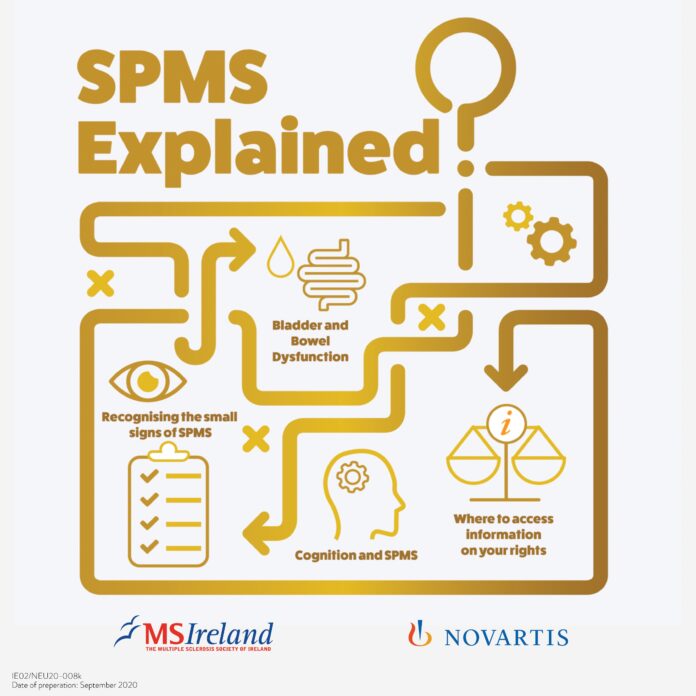
MS Ireland and Novartis have today launched a new video series, entitled “SPMS Explained”, which aims to support those living with secondary progressive multiple sclerosis (SPMS) in Ireland.
People with SPMS are typically diagnosed after 10 – 20 years living with relapsing remitting MS (RRMS) and studies indicate that 50% of those diagnosed with RRMS will transition to SPMS within 10 years, and 90% will transition within 25 years.ii With SPMS symptoms do not go away completely after a relapse or flare-up and there is a steady increase in disability.[iii]
The SPMS Explained video series has been developed in close collaboration with leading specialists including Professor Gavin Giovannoni, Professor of Neurology, Blizard Institute, Barts and the London School of Medicine and Dentistry, and Professor Niall Pender, Head of Department of Psychology, Beaumont Hospital and Associate Professor in Neuropsychology, Trinity College Dublin. The series addresses topics that are of key concern to people either living with RRMS, those transitioning to SPMS, or those that have transitioned.
Commenting on the launch of SPMS Explained, Ava Battles, CEO of MS Ireland said, “The transition to SPMS can be a daunting experience and one that brings up many questions.
Our aim in launching this video series is to ensure that there is valuable information available at all times so that none of these questions go unanswered. We hope that the series is a source of comfort and reassurance for people living with SPMS, but also for their families and loved ones.”
The series addresses topics such as: recognising the signs and symptoms of SPMS, cognition and SPMS, where to access information on your rights, as well as bladder and bowel dysfunction.
The videos have been created in collaboration with healthcare professionals and are based on international research in the field.
Professor Gavin Giovannoni, Professor of Neurology, Blizard Institute, Barts and the London School of Medicine and Dentistry said, “Our goal for treating people living with MS is to delay their disease progression for as long as possible, through early diagnosis and early treatment.
MS symptoms include vision problems, tingling and numbness, pain and spasms, weakness and fatigue. With SPMS, these symptoms worsen and occur more frequently and there are greater issues with cognition, bowel and bladder problems. It is important that any change in symptoms are tracked and are discussed with your neurologist.”
Dr Niall Pender, Associate Professor, Trinity College Dublin, and Principal Clinical Neuropsychologist at Beaumont Hospital Dublin said, “The transition from RRMS to SPMS impacts a person’s cognitive abilities and can result in a slowing of thinking speed, lapses in concentration or ability to retain information.
“The important thing to remember is that this is a disease of variability, not everyone will experience these symptoms and each individual will experience the transitioning process in a unique way. There are techniques we use to help people to manage their symptoms and minimise the impact on daily life.” he said.
Audrey Derveloy, General Manager and Country President, Novartis Ireland said, “We are committed to supporting the community of people living with SPMS in Ireland and we hope that the SPMS Explained video series helps foster a better sense of understanding around the process of transitioning to SPMS.”
Topics covered in the video series include:
- Recognising the small signs of SPMS
- Signs people should look out for when their MS progresses from RRMS to SPMS
- Importance of monitoring progression
- When to bring this to attention of your MS team
- Cognition and SPMS – What do you need to know
- Why is cognition impacted when transitioning to SPMS?
- What signs to look out for that may illustrate cognitive dysfunction
- When to discuss cognitive problems with your doctor
- Where to access information on your rights
- How to best access information about your rights
- Who to speak about your current situation
- Bladder and bowel dysfunction
- Why bladder and bowel dysfunction occur in SPMS
- Early signs to look out for
- How to improve or treat bladder and bowel problems
For more information, and to view the videos, visit: https://www.ms-society.ie/spms-explained










